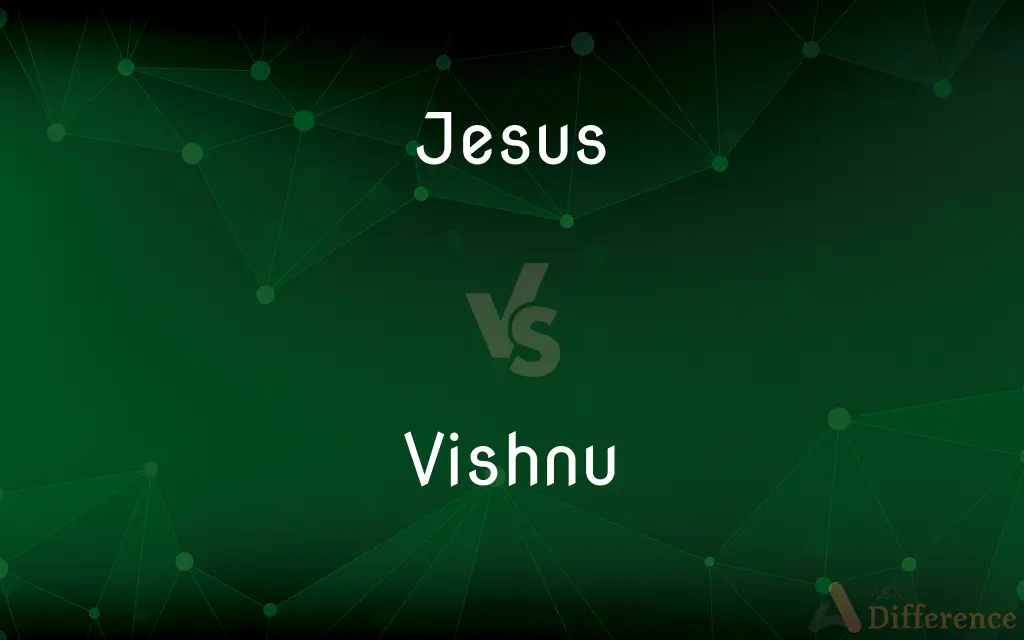Jesus vs. Vishnu — What's the Difference?
By Urooj Arif & Maham Liaqat — Updated on April 3, 2024
esus is central to Christianity as the Son of God and savior, while Vishnu is a major deity in Hinduism, known as the preserver of the universe.

Difference Between Jesus and Vishnu
Table of Contents
ADVERTISEMENT
Key Differences
Jesus is a pivotal figure in Christianity, believed to be the Son of God and the savior of humanity. His life, teachings, and resurrection are foundational to Christian faith, emphasizing salvation, forgiveness, and love. Christians view Jesus as God incarnate, who came to Earth to offer salvation to humanity through his death and resurrection. Vishnu, on the other hand, is one of the principal deities of Hinduism, known as the preserver within the Trimurti that also includes Brahma the creator and Shiva the destroyer. Vishnu is revered for his role in maintaining order and righteousness in the universe. He is believed to incarnate on Earth in various forms, called Avatars, including well-known ones like Rama and Krishna, to restore dharma (cosmic order) whenever it is threatened.
While Jesus's incarnation is central to the Christian belief in God's intervention in human history for salvation, Vishnu's avatars are numerous and manifest for the specific purpose of sustaining the cosmic order. This difference highlights the contrasting views on divine intervention and the nature of God in Christianity and Hinduism.
The worship practices and rituals associated with Jesus and Vishnu also differ significantly. Christians participate in sacraments such as Eucharist, which commemorates Jesus's Last Supper, and emphasize prayer, reading scriptures, and living according to Jesus's teachings. Conversely, Vishnu worship in Hinduism includes a variety of rituals like puja (worship), chanting mantras, and celebrating festivals dedicated to his avatars, reflecting a diverse and pluralistic approach to divinity.
The theological context surrounding Jesus and Vishnu is markedly different. Christianity, being monotheistic, centers on the belief in one God with Jesus as his Son and part of the Holy Trinity. Hinduism, with its polytheistic and monotheistic interpretations, views Vishnu as a supreme god within a vast and complex pantheon, where he coexists with an extensive array of gods and goddesses, each embodying different aspects of the divine.
Despite these differences, both Jesus and Vishnu teach values of love, compassion, and righteousness, and both play a crucial role in guiding their followers towards spiritual fulfillment and moral living. Their teachings and stories inspire millions around the world, shaping the ethical and spiritual landscapes of their respective faiths.
ADVERTISEMENT
Comparison Chart
Role in Religion
Son of God, savior.
Preserver of the universe.
Key Beliefs
Incarnation of God, salvation through his resurrection.
Incarnates as avatars to restore dharma.
Worship Practices
Sacraments, prayer, scripture reading.
Puja, mantra chanting, festivals.
Theological Context
Part of the Holy Trinity in monotheistic Christianity.
Supreme deity among many in Hinduism.
Teachings
Love, forgiveness, eternal life.
Righteousness, protection, cosmic order.
Compare with Definitions
Jesus
Central figure in Christianity, regarded as the Son of God and the savior of humanity through his resurrection.
Christians celebrate the resurrection of Jesus at Easter, reflecting on the promise of eternal life.
Vishnu
Symbolizes preservation, protection, and the embodiment of mercy and goodness in Hindu mythology.
Vishnu is often depicted as lying on the cosmic ocean, maintaining the universe in balance.
Jesus
A figure of compassion, sacrifice, and unconditional love, whose life and teachings form the foundation of Christian faith.
The parables of Jesus offer profound insights into human nature and the kingdom of God.
Vishnu
A principal deity in Hinduism, known as the preserver of the universe and part of the holy trinity including Brahma and Shiva.
Devotees pray to Vishnu for protection and the maintenance of the world order.
Jesus
In Christian doctrine, the second person of the Holy Trinity, fully divine and fully human.
The concept of Jesus being both God and man is central to Christian understanding of the incarnation.
Vishnu
Revered through various rituals, prayers, and chants, emphasizing his role as the nurturer and guardian of life.
The recitation of Vishnu Sahasranama, a list of a thousand names of Vishnu, is a common devotional practice.
Jesus
A historical and religious figure whose teachings and life are recorded in the New Testament of the Bible.
The teachings of Jesus, especially about love and forgiveness, have been a moral guide for millions.
Vishnu
Worshiped in various avatars, including Rama and Krishna, to restore dharma and guide devotees toward righteousness.
The epic tales of Rama and Krishna, avatars of Vishnu, are celebrated in Hindu festivals and scriptures.
Jesus
Regarded as the prophesied Messiah in Christian faith, who came to redeem humanity from sin.
Prophecies about the coming of Jesus as the Messiah are found throughout the Old Testament.
Vishnu
Known for his ten principal avatars (Dashavatara), each representing a different aspect of life and moral order.
Each avatar of Vishnu, from Matsya the fish to Kalki the warrior, symbolizes a divine intervention in cosmic affairs.
Jesus
The central figure of the Christian religion.
Vishnu
Vishnu (; [ʋɪʂɳʊ]; Sanskrit: विष्णु, IAST/ISO: Viṣṇu, lit. 'the pervader'), also known as Narayana and Hari, is one of the principal deities of Hinduism. He is the supreme being within Vaishnavism, one of the major traditions within contemporary Hinduism.Vishnu is known as "The Preserver" within the Trimurti, the triple deity of supreme divinity that includes Brahma and Shiva.
Jesus
Jesus (Greek: Ἰησοῦς, romanized: Iēsoûs, likely from Hebrew/Aramaic: יֵשׁוּעַ, romanized: Yēšūaʿ), c. 4 BC – AD 30 / 33, also referred to as Jesus of Nazareth or Jesus Christ, was a first-century Jewish preacher from Judea. He is the central figure of Christianity, the world's largest religion.
Vishnu
One of the principal Hindu deities, worshiped as the protector and preserver of worlds. Vishnu is often conceived as a member of the trimurti along with Brahma and Shiva.
Jesus
The Savior; the name of the Son of God as announced by the angel to his parents; the personal name of Our Lord, in distinction from Christ, his official appellation.
Thou shalt call his name Jesus; for he shall save his people from their sins.
Jesu, do thou my soul receive.
Vishnu
A divinity of the modern Hindu trimurti, or trinity. He is regarded as the preserver, while Brahma is the creator, and Siva the destroyer of the creation.
Jesus
AD 29)
Vishnu
The Sustainer; a Hindu divinity worshipped as the preserver of worlds
Common Curiosities
What is Vishnu known for?
Vishnu is a principal deity in Hinduism, known for preserving the universe and restoring cosmic order through his avatars.
Who is Jesus?
Jesus Christ is the central figure of Christianity, regarded as the Son of God and the savior of humanity.
Can Jesus and Vishnu be compared?
While they are central figures in their respective religions, their roles, attributes, and the theological context around them are distinct, making direct comparison challenging.
How do Christians worship Jesus?
Christians worship Jesus through practices such as prayer, participating in sacraments, and living according to his teachings.
What is the significance of Jesus’s resurrection?
Jesus’s resurrection is central to Christian faith, symbolizing victory over sin and the promise of eternal life for believers.
What are some forms of Vishnu?
Vishnu is known to manifest in several avatars, including Rama, Krishna, and Narasimha, among others, to restore dharma.
Is Vishnu worshiped alone?
Vishnu is often worshiped along with his consort, Lakshmi, and his avatars, in a variety of rituals and festivals.
How many avatars does Vishnu have?
Traditionally, Vishnu is said to have ten major avatars, known as the Dashavatara, though other texts mention more.
How is the concept of salvation viewed in Christianity vs. Hinduism?
In Christianity, salvation is through faith in Jesus Christ. In Hinduism, salvation (moksha) involves liberation from the cycle of birth and death, achievable through various paths including devotion to deities like Vishnu.
Do Jesus and Vishnu share any similarities?
Both figures are revered for their qualities of love, compassion, and guiding their followers towards a righteous path, despite the different contexts of their teachings.
What is the Holy Trinity?
In Christianity, the Holy Trinity refers to the understanding of God as three persons in one essence: the Father, the Son (Jesus), and the Holy Spirit.
What role does karma play in Vishnu’s teachings?
In Hinduism, karma, or the law of action and consequence, is fundamental, with Vishnu’s avatars often restoring balance and righteousness in alignment with karmic laws.
What does the term 'Christ' signify?
"Christ" comes from the Greek word for "anointed one," signifying Jesus's role as the chosen one who fulfills the prophecies of the Old Testament.
Are there female avatars of Vishnu?
Among the traditional avatars of Vishnu, all are male, but Hindu mythology includes stories of the goddess in various forms, reflecting a balance of male and female divine aspects.
How do the teachings of Jesus and Vishnu impact the world today?
The teachings of both Jesus and Vishnu continue to influence global culture, ethics, and spirituality, promoting values of love, compassion, and righteousness.
Share Your Discovery

Previous Comparison
Hone vs. Strop
Next Comparison
Convict vs. InmateAuthor Spotlight
Written by
Urooj ArifUrooj is a skilled content writer at Ask Difference, known for her exceptional ability to simplify complex topics into engaging and informative content. With a passion for research and a flair for clear, concise writing, she consistently delivers articles that resonate with our diverse audience.
Co-written by
Maham Liaqat















































